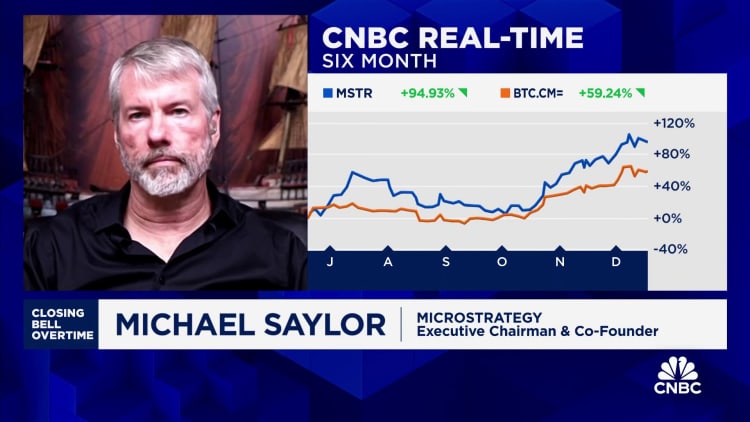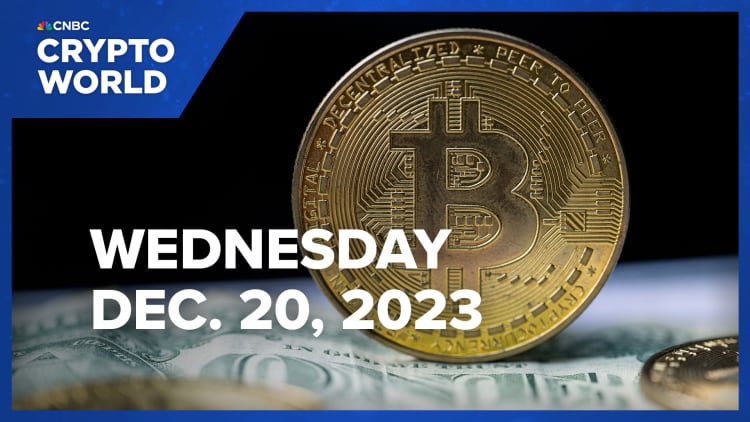
MicroStrategy CEO Michael Saylor speaks at the Bitcoin 2021 Convention, a crypto-currency conference held at the Mana Convention Center in Wynwood on June 04, 2021 in Miami, Florida.
Joe Raedle | Getty Images
MicroStrategy was founded almost 35 years ago and existed for most of its history as a little-known software company focused on business intelligence.
But in 2023, the stock has soared 337%, making it one of the biggest gainers in the U.S. among companies valued at $5 billion or more, topping Nvidia’s 234% rally and Meta’s 194% surge.
Unlike its tech peers, which rely on revenue growth and market share gains to fuel their stock prices, MicroStrategy’s investor appeal is almost exclusively due to bitcoin. The company began buying the cryptocurrency in mid-2020 and has since amassed roughly 174,530 bitcoins, worth about $7.65 billion as of late Friday.
Wall Street is so enamored by the story that the stock has about doubled bitcoin’s gain this year.
“It’s really bitcoin,” said Joseph Vafi, an analyst at Canaccord Genuity who has a buy recommendation on the stock. “All the other stuff is healthy and doing a good job, they’re not neglecting it. It’s doing well, it’s leading software in its sector. But it’s basically something we don’t have to worry about.”
MicroStrategy’s market cap is $8.5 billion, meaning 90% of its valued is tied directly to its bitcoin holdings. When bitcoin plummets or soars, so does MicroStrategy. In 2022, bitcoin’s 64% drop pushed MicroStrategy down 74%. Even after its huge pop this year, MicroStrategy shares are still below where they were trading at their high in 2021, during peak crypto.
The bitcoin strategy dates back to July 2020, when the company said it would start putting some of its cash towards alternative assets, including digital currencies. At the time, MicroStrategy had a market cap of roughly $1.1 billion, built on a software business that had been shrinking since 2015. Annual revenue was just under $500 million, and profit was minimal.
At the halfway point of 2020, MicroStrategy had just over $530 million in cash and short-term investments on its balance sheet. Co-founder Michael Saylor, who was CEO at the time, saw that money sitting virtually idle on the sidelines due to low interest rates and wanted to put it to work.
From there, he had to decide whether equities, precious metals or bitcoin would be the best use of funds.
“The reason we decided to buy bitcoin is because bitcoin represents a form of digital gold,” Saylor said on the first earnings call after the company announced its strategy. “It’s harder than gold. It’s smarter, it’s stronger, it’s faster than gold.”
Saylor’s decision created a way for investors to have stake in bitcoin through routine purchases of stock, rather than having to buy the coins directly. Saylor, who stepped down as CEO last year and assumed the role of executive chairman, told CNBC’s Morgan Brennan last week that he expects the bull market in bitcoin to continue next year. He said 99.9% of the capital in the world is invested in real estate, stocks, bonds and commodities, with only 0.1% allocated toward bitcoin.
“People, as they get educated on digital assets, are realizing that they ought to be allocating more and more of their capital to this digital asset and so they’re moving from .1 to .2%,” said Saylor, who co-authored a book about bitcoin last year titled “What is Money?”

Novel use of cash
MicroStrategy isn’t the first company to put some of its cash pile into alternative investments, and it’s not the last to look for ways to generate outsized returns on that money. Earlier this month, GameStop gave CEO Ryan Cohen, who gained minor celebrity status as an investor, permission to use company cash to purchase stock.
But MicroStrategy is unique in that it’s become viewed almost exclusively as a bitcoin holding company.
“Michael Saylor’s kind of a visionary,” said Vafi. “He saw this as an opportunity to really exploit the fact that they had a lot of cash and a pristine balance sheet and start this bitcoin treasury experiment. And it’s worked out well and so they’re continuing down that path.”
In analyzing why MicroStrategy’s stock has so dramatically outperformed bitcoin this year, Vafi described it as a “scarcity premium,” because there are limited ways for equity investors to tap the market.
That’s potentially changing in the new year, as investors gear up for a flurry of bitcoin exchange-traded funds (ETFs). Currently, there are bitcoin futures ETFs, which are comprised of contracts to buy and sell bitcoin but not of the cryptocurrency itself. And investors can buy into the Grayscale Bitcoin Trust, a fund that owns bitcoin and trades over the counter rather than on a major exchange.
Grayscale sued the SEC last year after the regulator denied its application to create a spot bitcoin ETF on concerns about investor protections. In August of this year, an appeals court ruled in favor of Grayscale, a decision than many in the industry viewed as paving the way for a new crop of ETFs. Asset managers, including BlackRock, Fidelity and Invesco, have filed with the SEC for their own products.
Vafi said the prospect of competition poses little threat to MicroStrategy.
“I call it right now a very high-class problem to a certain degree,” he said. “If a bitcoin ETF gets approved, the price of bitcoin is probably headed higher and potentially materially higher.”
MicroStrategy also presents more than just a bet on the direction of bitcoin. While ETFs are passively managed, MicroStrategy has the option to put its bitcoin holdings to work, using them, for example, as collateral to create more business opportunities.
“MicroStrategy is encouraged by the continuing maturity of the regulatory environment around bitcoin as well as the increased institutional demand that we are seeing today,” Shirish Jajodia, the company’s vice president of treasury and investor relations, told CNBC in an email. “We do believe it will have a positive impact on the adoption of bitcoin by mainstream investors as well as corporations.”
MicroStrategy’s software business is a big plus too, Saylor said on the company’s most recent earnings call. It’s a proven cash flow generator, enabling the company to buy more bitcoin, he said.
For the many investors betting against MicroStrategy, it’s been a tough year.
As of early December, crypto stock short sellers were down $6.1 billion for the year, with the rally in Coinbase hurting them the most, according to S3 Partners. In the first three quarters of the year, short sellers spent $2.19 billion covering their bets, the firm said, with the majority of the buying in Coinbase and MicroStrategy.
Short sellers this year have lost $4 billion on Coinbase and $1.4 billion on MicroStrategy, according to data provided by S3 last week. Some 23% of MicroStrategy’s shares available to the public are shorted, S3 said, which is second highest among crypto companies, behind only bitcoin miner Marathon Digital. The average for U.S. stocks is 5%.
MicroStrategy shows no signs of slowing down when it comes to snapping pu bitcoin. The company said it purchased roughly 16,130 bitcoins in November for over $593 million, even with the price continuing to rise. That’s more bitcoin than it’s bought in any full quarter since the first three months of 2021.
— CNBC’s Kate Dore contributed to this report

